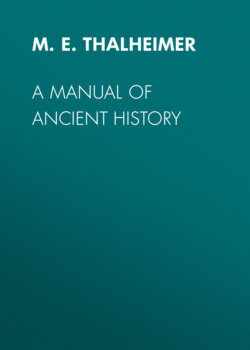Читать книгу A Manual of Ancient History - M. E. Thalheimer - Страница 19
На сайте Литреса книга снята с продажи.
KINGDOMS OF ASIA MINOR.
Оглавление55. The Anatolian peninsula, divided by its mountain chains into several sections, was occupied from very ancient times by different nations nearly equal in power. Of these, the Phrygians were probably the earliest settlers, and at one time occupied the whole peninsula. Successive immigrations from the east and west pressed them inward from the coast, but they still had the advantage of a large and fertile territory. They were a brave but rather brutal race, chiefly occupied with agriculture, and especially the raising of the vine.
56. The Phrygians came from the mountains of Armenia, whence they brought a tradition of the Flood, and of the resting of the ark on Mount Ararat. They were accustomed, in primitive times, to hollow their habitations out of the rock of the Anatolian hills, and many of these rock cities may be found in all parts of Asia Minor. Before the time of Homer, however, they had well-built towns and a flourishing commerce.
57. Their religion consisted of many dark and mysterious rites, some of which were afterward copied by the Greeks. The worship of Cyb´ele, and of Saba´zius, god of the vine, was accompanied by the wildest music and dances. The capital of Phrygia was Gor´dium, on the Sanga´rius. The kings were alternately called Gor´dias and Mi´das, but we have no chronological lists. Phrygia became a province of Lydia BC 560.
58. In later times Lydia became the greatest kingdom in Asia Minor, both in wealth and power, absorbing in its dominion the whole peninsula, except Lycia, Cilicia, and Cappadocia. Three dynasties successively bore rule: the Atyadæ, before 1200 BC; the Heraclidæ, for the next 505 years; and the Mermnadæ, from BC 694 until 546, when Crœsus, the last and greatest monarch, was conquered by the Persians. The name of this king has become proverbial from his enormous wealth. When associated with his father as crown prince, he was visited by Solon of Athens, who looked on all the splendor of the court with the coolness of a philosopher. Annoyed by his indifference, the prince asked Solon who, of all the men he had encountered in his travels, seemed to him the happiest. To his astonishment, the wise man named two persons in comparatively humble stations, but the one of whom was blessed with dutiful children, and the other had died a triumphant and glorious death. The vanity of Crœsus could no longer abstain from a direct effort to extort a compliment. He asked if Solon did not consider him a happy man. The philosopher gravely replied that, such were the vicissitudes of life, no man, in his opinion, could safely be pronounced happy until his life was ended.
59. Crœsus extended his power over not only the whole Anatolian peninsula, but the Greek islands both of the Ægean and Ionian seas. He made an alliance with Sparta, Egypt, and Babylon to resist the growing empire of Cyrus; but his precautions were ineffectual; he was defeated and made prisoner. He is said to have been bound upon a funeral pile, or altar, near the gate of his capital, when he recalled with anguish of heart the words of the Athenian sage, and three times uttered his name, “Solon, Solon, Solon!” Cyrus, who was regarding the scene with curiosity, ordered his interpreters to inquire what god or man he had thus invoked in his distress. The captive king replied that it was the name of a man with whom he wished that every monarch might be acquainted; and described the visit and conversation of the serene philosopher who had remained undazzled by his splendor. The conqueror was inspired with a more generous emotion by the remembrance that he, too, was mortal; he caused Crœsus to be released and to dwell with him as a friend.
